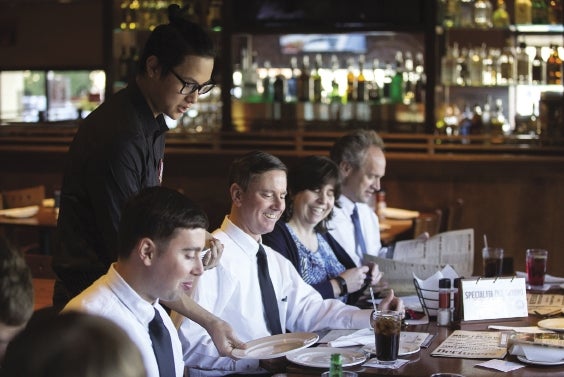Grand Bargain fallout: Restaurants look to price increases, staffing cuts to survive 80% minimum wage hike
Adam Hicks wants his employees to make a decent wage. He wants them to be able to afford rent, buy a new car and pay for school supplies for their children.
He also needs to keep two busy restaurants in Milford and Worcester afloat. Balancing both of those goals in an industry with a low-profit margin is now going to be more difficult with wages for restaurant employees increasing over the next five years.
Under the Grand Bargain legislation passed by state lawmakers in June to avoid a series of ballot questions on wage and benefit issues, minimum wage will increase to $15 gradually for five years beginning in January, and the hour rate for tipped workers will increase to $6.75 an hour over the same period.
“Adding these increases is going to make it harder to succeed in the long term,” Hicks said. “This drives up wages for everybody.”
Figuring out how to stay in business
According to Hicks, owner of Milford's Depot Street Tavern and sister restaurant Maddi's Cookery and TapHouse in Worcester, a good server can already make upwards of $35 an hour, and most of his cooks earn more than $15 an hour.
Now, an entry-level high school student in the kitchen will start at $15 an hour. Seasoned cooks could then be bumped up to $20 an hour, if not more.
To afford those salaries, menu prices may go up or fewer staff could be scheduled, said the restaurateur.
“When costs go up, something's gotta give,” Hicks said.
Robb Ahlquist, co-owner of Worcester Restaurant Group, which owns and operates Via Italian Table, 111 Chop House and The Sole Proprietor, said in an email the Grand Bargain will be a significant hardship, especially for small businesses and restaurants.
“But it's a done deal, and we now have to live with it,” he said, calling it a waste of time to comment on the new government-imposed hardships.
“We need to spend time figuring out how to stay in business,” he said.
Price increases or cuts
The tipped minimum wage, increasing by 80 percent, will largely benefit servers, who are already the highest earners in the restaurant, said Steve Clark, vice president of government affairs for the Massachusetts Restaurant Association.
“If you factor in the last time minimum wage went up, we're talking about a 157-percent increase to labor costs on an industry that on average makes 5 cents for every dollar,” Clark said.
Clark said restaurants in Boston's Seaport District are closing due to rising rents in the booming area. With staff costs rising, those hardships will accelerate.
“We will see some more closings,” he said.
Restaurants will be forced to undertake a combination of changes, Clark said. Prices could be raised, the company structure could be reevaluated or certain menu items could be eliminated if they're too costly to prepare.
Eateries may be forced to educate their customers of what they're paying for when they notice sharp price increases.
To save on those labor costs, some restaurants could even cut jobs in favor of self-service kiosks or handheld devices installed at tables. Nobody wants technology to replace a job where one could earn upwards of $70,000 annually, but it is a legitimate option if a restaurant heads into the red, Clark said.
“That iPad can't call in sick,” Clark said.
Restaurants could instead choose to pay tipped workers a flat rate of $15 an hour, but if they don't make tips, most top-end waiters and waitresses would bolt for an employer willing to take on the wage increases, Clark said.
Taking on the wage increases
Worcester restaurants deadhorse hill and simjang hope to be able to maintain current staffing levels, menu prices and still provide its trademark service to guests even while labor costs skyrocket, said Jared Forman, chef and co-owner of the two restaurants.
“We want all employees to be able to make a living wage, support themselves and their families and have a sustainable career,” said Forman.
The restaurant ownership group – including Forman, Sean Woods and Bert LaValley – pride themselves on a complete experience starting from the moment a guest walks into the door to when they leave.
Employing a highly skilled staff with minimal turnover is an important part of providing that experience, Forman said.
Big corporate chains not offering the same service or quality of product operating could be the ones hit hardest, Forman said. Those restaurants run like well-oiled machines, but the people working there are the ones the most neglected, he said.
To make it work in the Grand Bargain era, the restaurant industry needs the public's help, Forman said. Diners need to resist the cheaper allure of a chain restaurant and give their hard-earned money to local businesses.
“Go support places that are caring enough to pay staff well and put them in a really great place to learn, succeed and grow,” he said.












0 Comments